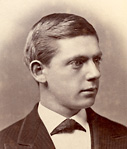The Henry Russel Lecture was named after a successful attorney and alumnus.
Russel was born in Detroit in 1852 and received his early education at his local public school, then at the Philo M. Patterson Classical and Mathematical Academy in Detroit. Russel’s studies there prepared him to attend U-M, where he earned his Bachelor of Arts degree in 1873. Russel moved on to study law at what was then called the State University, receiving an LL.B. degree in 1875 and in the next year an honorary Master of Arts.
He was among the university’s alumni from the 19th century to become a formative figure in the history of the state of Michigan.
After earning his law degree, Russel took a position with a prominent Detroit attorney, Alfred Russell, and was admitted to the bar in 1875. Though he remained in the partnership until 1912 and was a highly successful corporate attorney, his influence lay in his extensive business and real estate involvement.
This began in 1877 when Russel was appointed assistant attorney of the Michigan Central Railroad Co. There he enjoyed a long and successful career as a corporate lawyer. When he became vice president of the railroad company he finally left the law firm and turned all his attentions to his business and real estate development.
Over time his interests were many and complex. As president of Olds Motor Co. he controlled one of the largest corporations in Detroit. At different times in the late 19th and early 20th centuries Russel was president of the Cass Farm Co., a member of the executive committee of Union Trust Co., and director of Michigan State Telephone Co.

Photo courtesy Bentley Historical Library.
He also had extensive real estate holdings. For example, through his involvement with the River Rouge Improvement Co., he is credited with the initial and rapid development of that industrial section of Detroit. He anticipated transportation needs as industry grew in the city, spearheading the efforts to set railroad track for shipping as well as travel around the city.
Russel also was engaged in the public life of Detroit. He was a member of the civic organizations and social clubs, and credited with being a great supporter of the arts.
When he died in 1920 he left a bequest of $10,000 to U-M. His will stated that income from the investments should be used to provide additional compensation to members of the “instructing staff.” In May 1925 the Board of Regents established that each year $250 should be awarded to an outstanding faculty member selected to provide the Henry Russel Lecture and an additional $250 to another promising faculty member to be announced at the lecture each year.
The selection of the lecturer was entrusted to the executive board of the Research Club. This was established in 1900 to provide a forum for those engaged in research; it allowed them to share their interests and promote their activity to the administration. The fact that the Research Club was given the responsibility of selecting the lecturer signaled a fundamental shift in the ambitions of the university as it changed from a teaching institution to a research university.
Over time the nature of the Research Club changed and the selection process was very cumbersome. In 1999 the Board of Regents determined that the administrative responsibility for the selection process would be the joint responsibility of the vice president for research and the dean of the Rackham Graduate School, assisted by a committee of past holders of the lectureship.

